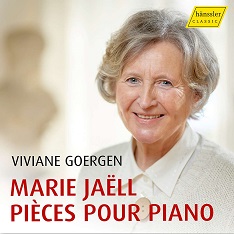Die luxemburgisch-schweizerische Pianistin Viviane Goergen bringt mit Pièces pour piano d’après une lecture de Dante von Marie Jaëll (1846-1925) ein Album auf den Markt, das der unbequemen und herausfordernden Musik der Komponistin Hochachtung zollt. Denn einfach ist dieses dreiteilige Werk ‘Ce qu’on entend dans l’enfer’, ‘Ce qu’on entend dans le purgatoire’ und ‘Ce qu’on entend dans le paradis’ (‘Was man in der Hölle hört’, ‘Was man im Fegefeuer hört’ und ‘Was man im Paradies hört’) nicht und fordert von Hörer allerhöchste Konzentration. Die drei mal sechs Klavierstücke von je rund vier Minuten Spieldauer erschließen sich einem nur langsam. Jaëll war ihrer Zeit deutlich voraus. Als Schülerin von Saint-Saëns und Franck ging sie ganz eigene Wege, tatkräftig unterstützt von ihrem Mentor und Freund Franz Liszt. Diese Klavierstücke in Anlehnung an Dantes Göttliche Komödie wurden 1894 komponiert und sind das letzte große Werk der Komponistin, die sich ab dann der musikwissenschaftlichem Forschung zuwandte. Marie Jaëll galt neben ihrer Kompositionstätigkeit als eine überragende Klaviervirtuosin.
Viviane Goergen spielt diese 18 Klavierstücke sehr analytisch und präzise. Wenn man anfangs dann auch einen emotionalen Gehalt vermisst, so wird doch schnell klar, dass Goergens stukturbetonte Interpretation die verschiedenen Stimmungen und Farben des Werkes doch sehr gut wiedergibt. Viviane Goergen überzeugt letztendlich den Hörer durch eine sehr gut vorbereitete, klanglich wie stilistisch wohl ausbalancierte und in jedem Moment packende Wiedergabe, der Objektivität zwar eine gewisse Distanz zur Musik schafft, sie aber gerade dadurch sehr deutlich und mit klaren architektonischen Linien erleben lässt.
With Pièces pour piano d’après une lecture de Dante by Marie Jaëll (1846-1925), Luxembourgian-Swiss pianist Viviane Goergen releases an album that pays tribute to the composer’s uncomfortable and challenging music. The three-part work « Ce qu’on entend dans l’enfer », « Ce qu’on entend dans le purgatoire » and « Ce qu’on entend dans le paradis » (« What one hears in hell », « What one hears in purgatory » and « What one hears in paradise ») is not easy and requires the listener’s utmost concentration. The three times six piano pieces, each about four minutes long, reveal themselves only slowly. Jaëll was clearly ahead of her time. A student of Saint-Saëns and Franck, she went her own way, actively supported by her mentor and friend Franz Liszt. These piano pieces, based on Dante’s Divine Comedy, were composed in 1894 and are the last major works of the composer, who then turned to musicological research. In addition to her compositional activities, Marie Jaëll was considered an outstanding piano virtuoso.
Viviane Goergen plays these 18 piano pieces very analytically and precisely. Even if one initially misses an emotional content, it soon becomes clear that Goergen’s interpretation, which emphasizes the structure, reproduces the various moods and colors of the work very well. Viviane Goergen convinces the listener with a very well-prepared, tonally and stylistically well-balanced performance that is gripping at every moment, creating a certain distance to the music, but allowing it to be experienced very clearly and with clear architectural lines.
https://www.pizzicato.lu/marie-jaells-monumentaler-dante-zyklus/


















